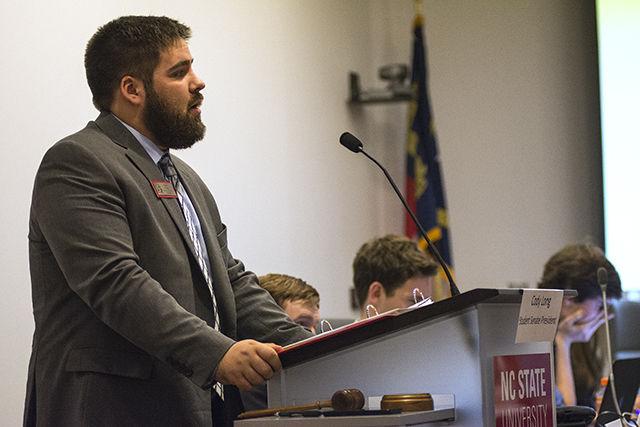A bill in Student Government, which strongly recommended that the Student Health Center adopt a referral policy to ensure students who are pregnant receive comprehensive, non-directive and medically accurate healthcare information and counseling, was sent back to committee on Wednesday to be further deliberated.
The bill asked that all advertising within and materials distributed by the Health Center include a disclaimer that states whether the referral center has a licensed medical provider on staff.
It would also require the NC State Women’s and Student Health Center to encourage women who are or may be pregnant to consult with a licensed provider and indicate whether referral centers provide or refer for abortion, emergency contraception or prenatal care.
The bill also asks that a disclaimer be added to the Student Health Center website that specifies all consultations, materials and referrals shall provide comprehensive, non-directive and medically accurate health care information, including the full-range of reproductive health care options available to the patient, effective upon enrollment.
Lela Johnston, a senior studying political science and member of the Wake County Young Democrats and NARAL Pro-Choice at NC State club, said she got the idea for the bill when she went to the women’s health clinic and found that she was referred to a center called Gateway at the reception desk of the Women’s Health clinic.
Gateway is a pregnancy and sexual health center located on Hillsborough Street less than a mile from campus. The center offers HIV/STD testing, pregnancy testing, limited ultrasounds, counseling options, post-abortion support, classes about childbirth, infant care and parenting, as well as information about abortions, adoption and parenting, according to the center’s website.
Gateway does not provide abortions or refer to abortion clinics, according to its website.
Johnston said Gateway is a crisis pregnancy center: a nonprofit, generally religious center that operates within the goal of dissuading women from having abortions.
“When I asked about options for pregnant students, the receptionist only talked about a local crisis pregnancy center, which happened to be the only referral brochure made available to students in the center,” Johnston said.
Hannah Osborne, an NC State alumnus and NARAL Pro-Choice NC Campus organizer, said the way the Health Center’s website is named in regards to pregnancy options is slightly confusing.
The referrals are on a webpage named “Pregnancy testing,” and the webpage is split into two sections: adoption resources and abortions services.
Planned Parenthood in Raleigh, for example, doesn’t perform abortions but falls under that abortion services category because if offers information and referrals for abortions.
“If you think you’re pregnant or you are pregnant, you’re not going to naturally want to select a tab that says ‘pregnancy testing,’ you’re going to want to see the tab that says reproductive health care or reproductive referrals,” Osborne said.
Osborne said it would be ideal if there was one section on the website that references students to places that are for comprehensive reproductive health care options, which could refer you to services that handle adoption, bringing a child to term and abortion options.
Planned Parenthood in Raleigh does all of these things, Osborne said, yet it is still listed under abortion services.
Justine Hollingshead, assistant to the vice chancellor and dean in the Division of Academic and Student Affairs, said DASA is currently updating more than 100 websites, including the Student Health Center, to address the students’ problems with the sites.
The website should be fixed by fall orientation, Hollingshead said.
According to Hollingshead, while the bill was well intentioned and brought up good points about website accuracy, some parts of the bill were poorly researched and could have been clarified.
When a student who visits the Women’s Health Center at NC State receives a positive pregnancy test result, the patient is then able to meet with the provider and receive written information about their options moving forward, according to Leah Arnett, the director of Student Health Services.
The written document indicates that women who have received a positive result have the option to continue the pregnancy and raise the child, continue the pregnancy and put the child up for adoption or end the pregnancy through an abortion.
The document provides links to outside sources of information about pregnancy and abortion, including Planned Parenthood and the Religious Coalition for Reproductive Choice.
It also provides a list of five abortion providers in the Triangle area and lists information about costs and procedures.
The patient is always the one to decide on where to receive future care, Arnett said.
When speaking at the Student Senate meeting, Arnett took issue with the language on the bill, which grouped the Women’s Center and the Student Health Center as one entity. The two are in fact separate, Arnett said. The Women’s Health Clinic is a part of the Student Health Center, and the Women’s Center falls under the operation of the Office of Institutional Equity and Diversity.
“We’re looking to see what happens at NC State and then going forward, students really want for something to happen and change,” Osborne said.
Zack King, a junior studying political science and English and the senator that sponsored the bill, said the Appalachian State University Student Government will be looking to pass similar legislation in place to combat the presence of crisis pregnancy centers on campus.








